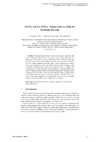Identificador persistente para citar o vincular este elemento:
https://accedacris.ulpgc.es/jspui/handle/10553/15843
| Campo DC | Valor | idioma |
|---|---|---|
| dc.contributor.author | Freitas, Valentim | en_US |
| dc.contributor.author | Ravelo-García, Antonio | en_US |
| dc.contributor.author | Morgado-Dias, F. | en_US |
| dc.date.accessioned | 2016-02-23T03:31:27Z | |
| dc.date.accessioned | 2018-02-21T14:33:37Z | - |
| dc.date.available | 2016-02-23T03:31:27Z | |
| dc.date.available | 2018-02-21T14:33:37Z | - |
| dc.date.issued | 2014 | en_US |
| dc.identifier.isbn | 978-84-617-1860-3 | en_US |
| dc.identifier.uri | https://accedacris.ulpgc.es/handle/10553/15843 | - |
| dc.description.abstract | Freshman students always present lower success rates than other levels of students. Digital systems is a course usually taught at first year studentsand its success rate is not very high. In this work we introduce three digital tools to improve freshman learning designed for easy use and one of them is a tool for mobile terminals that can be used as a game. The first tool is ParTec and is used to implement and test the partition technique. This technique is used to eliminate redundant states in finite state machines. This is a repetitive task that students do not like to perform. The second tool is called KarnUMa and is used for simplifying logic functions through Karnaugh Maps. Simplifying logical functions is a core task for this course and although students usually perform this task better than other tasks, it can still be improved. The third tool is a version of KarnUMa, designed for mobile devices. All the tools are available online for download and have been a helpful tool for students. | en_US |
| dc.format | application/pdf | es |
| dc.language | eng | en_US |
| dc.publisher | Universidad de Las Palmas de Gran Canaria (ULPGC) | en_US |
| dc.source | I Jornadas Iberoamericanas de Innovación Educativa en al ámbito de las TIC (2014), p. 13-22 | en_US |
| dc.subject | 33 Ciencias tecnológicas | en_US |
| dc.subject.other | Karnaugh Map | en_US |
| dc.subject.other | Partition Technique | en_US |
| dc.subject.other | Digital tools | en_US |
| dc.subject.other | Self-learning | en_US |
| dc.subject.other | Quine- McCluskey | en_US |
| dc.title | ParTec and KarnUMa-Digital tools as a help for freshman learning | en_US |
| dc.type | info:eu-repo/semantics/conferenceObject | en_US |
| dc.type | ConferenceObject | en_US |
| dc.relation.conference | I Jornadas Iberoamericanas de Innovación Educativa en el Ámbito de las TIC y las TAC (InnoEducaTIC 2014) | en_US |
| dc.compliance.driver | 1 | es |
| dc.identifier.absysnet | 719136 | - |
| dc.identifier.crisid | -;-;- | |
| dc.description.lastpage | 22 | en_US |
| dc.description.firstpage | 13 | en_US |
| dc.investigacion | Ingeniería y Arquitectura | en_US |
| dc.rights.accessrights | info:eu-repo/semantics/openAccess | es |
| dc.type2 | Actas de congresos | en_US |
| dc.description.numberofpages | 10 | en_US |
| dc.utils.revision | Sí | en_US |
| dc.identifier.ulpgc | Sí | en_US |
| dc.contributor.buulpgc | BU-ING | en_US |
| item.grantfulltext | open | - |
| item.fulltext | Con texto completo | - |
| crisitem.event.eventsstartdate | 27-11-2014 | - |
| crisitem.event.eventsenddate | 28-11-2014 | - |
| crisitem.author.dept | GIR IDeTIC: División de Procesado Digital de Señales | - |
| crisitem.author.dept | IU para el Desarrollo Tecnológico y la Innovación en Comunicaciones (IDeTIC) | - |
| crisitem.author.dept | Departamento de Señales y Comunicaciones | - |
| crisitem.author.orcid | 0000-0002-8512-965X | - |
| crisitem.author.parentorg | IU para el Desarrollo Tecnológico y la Innovación en Comunicaciones (IDeTIC) | - |
| crisitem.author.fullName | Ravelo García, Antonio Gabriel | - |
| Colección: | Actas de congresos | |
Visitas
299
actualizado el 16-ene-2026
Descargas
126
actualizado el 16-ene-2026
Google ScholarTM
Verifica
Altmetric
Comparte
Exporta metadatos
Los elementos en ULPGC accedaCRIS están protegidos por derechos de autor con todos los derechos reservados, a menos que se indique lo contrario.
